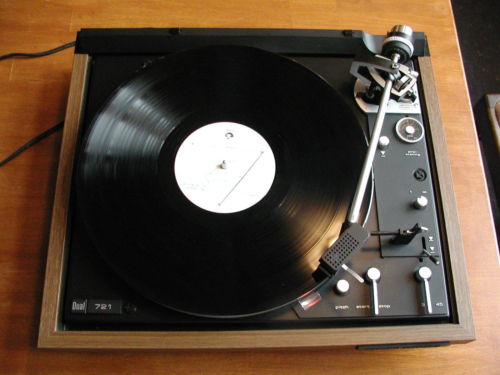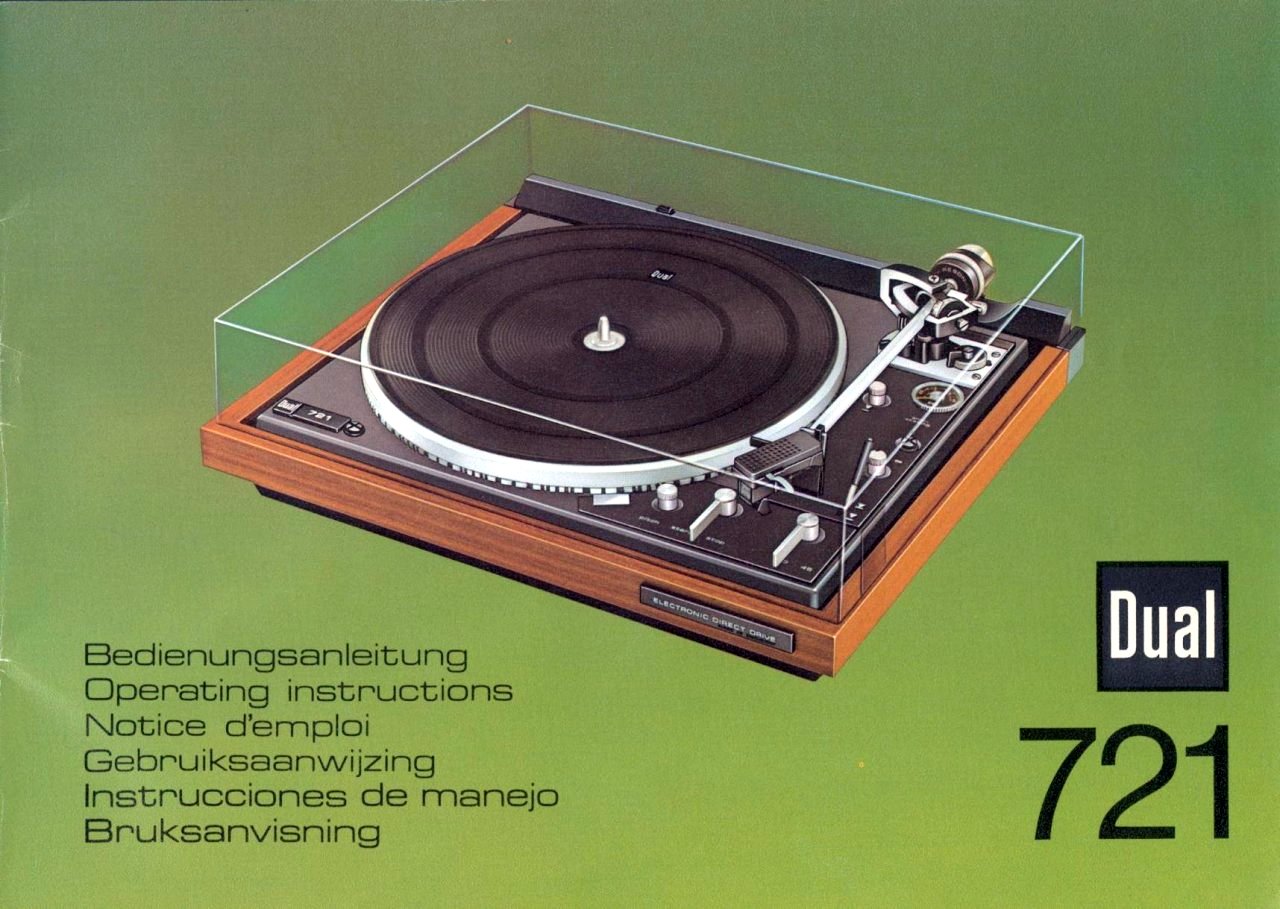Difference between revisions of "Dual CS 721"
(Bild) |
|||
| (13 intermediate revisions by 5 users not shown) | |||
| Line 1: | Line 1: | ||
__NOTOC__ | __NOTOC__ | ||
| − | == | + | == Data == |
| − | {{ | + | {{navigation}} |
| − | ''' | + | '''General''' |
| − | * | + | * Manufacturer: [[Dual]] Steidinger Brothers |
| − | * | + | * Model: CS 721, CS 721 S in black |
| − | * | + | * Type: Record player |
| − | * | + | * Years of manufacture: 1976 - 1979 |
| − | * | + | * Made in: Germany |
| − | * | + | * Color: Walnut, Black |
| − | * | + | * Power consumption: 2,5 Watt |
| − | * | + | * Dimensions: 424 x 150 x 368 mm (WxHxD) |
| − | * | + | * Weight: 7.8 kg |
| + | * Original price approx.: 830 DM with Shure V 15 III | ||
| − | ''' | + | '''Connections''' |
| − | * | + | * Outputs: |
| − | * | + | * Inputs: |
| − | ''' | + | '''Technical Data''' |
| − | * | + | * Drive: Direct (EDS 1000-2) |
| − | * | + | * Speed: 33 1/3, 45 UPM |
| − | * | + | * Synchronous fluctuations: ±0,03%/0,018% (DIN rated/WRMS) |
| − | * | + | * Rumble noise ratio: 70 dB |
| − | * | + | * Turntable: 304mm die-cast aluminium, 1.5 Kg; |
| − | * | + | * Total rotating mass of drive system (rotor with platter): 3 KG |
| − | * | + | * Operating mode: fully automatic |
* Pitch: ±5% | * Pitch: ±5% | ||
| − | ''' | + | '''Special Features''' |
| − | * | + | * With magnetic pickup system Shure V 15 III |
* Antiresonator | * Antiresonator | ||
* Subchassis | * Subchassis | ||
| − | * | + | * Continuous playback circuit |
| − | * | + | * Illuminated stroboscope |
| − | * | + | * Height-adjustable tone arm |
| − | * | + | * tonearm lift with adjustable lowering speed |
| − | * | + | * anti-skating |
| − | * | + | * Weight-balanced tonearm, adjustment of the contact force by means of spring |
| − | == | + | == Remarks == |
| − | + | * Other models of the same series: | |
| − | * [[Dual CS 504 | + | * [[Dual CS 504]] |
| − | * [[Dual CS 521 | + | * [[Dual CS 510]] |
| − | * [[Dual | + | * [[Dual CS 521]] |
| − | * [[Dual | + | * [[Dual CS 601]] |
| − | * [[Dual CS 704 | + | * [[Dual CS 604]] |
| + | * [[Dual CS 621]] | ||
| + | * [[Dual CS 704]] | ||
| + | * [[Dual CS 721]] | ||
| − | |||
| − | |||
| − | == | + | == Pictures == |
| + | * Image: Dual CS-721 in black | ||
| + | [[Image:721two.jpg]] | ||
| + | |||
| + | |||
| + | * Picture: Dual CS-721 in walnut | ||
| + | [[File:Dual CS 721.jpg]] | ||
| + | |||
| + | |||
| + | * Excerpt from instruction manual: Dual CS-721 in walnut | ||
| + | [[File:Dual CS-721-Prospekt-1.jpg]] | ||
| + | |||
| + | |||
| + | == Reviews == | ||
| + | * Last top of the line model with medium weight (~12gr) tonearm before the ULM era. | ||
| + | * Very flexible in cartridge choice thanks to this and the convenient VTA adjustment option. | ||
| + | * Although already equipped with a good V15/III L-M from the factory, the use of much better TAs is worthwhile. As with some other Dual models, the arm has a very good "ratio" | ||
| + | with "budget" MMs from Denon (DL30x),Dynavector (DV23/DV17) as well as various top MMs from Audio Technica (e.g. AT20SLa). | ||
| + | From today's point of view, the 721 lacks above all a quartz lock of the drive servo control and a housing of equivalent quality to the device. | ||
| + | |||
| + | |||
| + | * The above mentioned prices are probably former list prices, because already in the Hifi Yearbook 9 the 721 with V15 is listed with 728 DM. | ||
| + | * At the beginning of the eighties the 721s from the newer production (the ones with pick plate) were sold for ~ 500 DM and were sold off in piles as discontinued models. | ||
| + | Meanwhile the 721 tends to lover prices in the used market. | ||
| + | |||
| + | |||
| + | Unlike many Japanese direct drives, the servo control of the motor is not based on a special PLL chip which is now unobtanium. | ||
| + | |||
== Links == | == Links == | ||
| − | [[ | + | |
| + | [[Category:Turntables]] | ||
Latest revision as of 05:34, 5 May 2019
Data
General
- Manufacturer: Dual Steidinger Brothers
- Model: CS 721, CS 721 S in black
- Type: Record player
- Years of manufacture: 1976 - 1979
- Made in: Germany
- Color: Walnut, Black
- Power consumption: 2,5 Watt
- Dimensions: 424 x 150 x 368 mm (WxHxD)
- Weight: 7.8 kg
- Original price approx.: 830 DM with Shure V 15 III
Connections
- Outputs:
- Inputs:
Technical Data
- Drive: Direct (EDS 1000-2)
- Speed: 33 1/3, 45 UPM
- Synchronous fluctuations: ±0,03%/0,018% (DIN rated/WRMS)
- Rumble noise ratio: 70 dB
- Turntable: 304mm die-cast aluminium, 1.5 Kg;
- Total rotating mass of drive system (rotor with platter): 3 KG
- Operating mode: fully automatic
- Pitch: ±5%
Special Features
- With magnetic pickup system Shure V 15 III
- Antiresonator
- Subchassis
- Continuous playback circuit
- Illuminated stroboscope
- Height-adjustable tone arm
- tonearm lift with adjustable lowering speed
- anti-skating
- Weight-balanced tonearm, adjustment of the contact force by means of spring
Remarks
- Other models of the same series:
- Dual CS 504
- Dual CS 510
- Dual CS 521
- Dual CS 601
- Dual CS 604
- Dual CS 621
- Dual CS 704
- Dual CS 721
Pictures
- Image: Dual CS-721 in black
- Picture: Dual CS-721 in walnut
- Excerpt from instruction manual: Dual CS-721 in walnut
Reviews
- Last top of the line model with medium weight (~12gr) tonearm before the ULM era.
- Very flexible in cartridge choice thanks to this and the convenient VTA adjustment option.
- Although already equipped with a good V15/III L-M from the factory, the use of much better TAs is worthwhile. As with some other Dual models, the arm has a very good "ratio"
with "budget" MMs from Denon (DL30x),Dynavector (DV23/DV17) as well as various top MMs from Audio Technica (e.g. AT20SLa). From today's point of view, the 721 lacks above all a quartz lock of the drive servo control and a housing of equivalent quality to the device.
- The above mentioned prices are probably former list prices, because already in the Hifi Yearbook 9 the 721 with V15 is listed with 728 DM.
- At the beginning of the eighties the 721s from the newer production (the ones with pick plate) were sold for ~ 500 DM and were sold off in piles as discontinued models.
Meanwhile the 721 tends to lover prices in the used market.
Unlike many Japanese direct drives, the servo control of the motor is not based on a special PLL chip which is now unobtanium.

